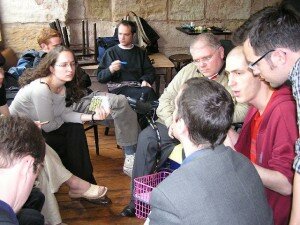10 Tips for Volunteer Reflection
 How do you communicate the value of a service event by connecting it with the bigger picture? Reflection helps you see how your service – and the service of other volunteers working with you – has benefited the community. Through reflection, you can think about your commitment, the work you did, how it affected you, the impact it made on the community, and future actions you can take to continue to change your world.
How do you communicate the value of a service event by connecting it with the bigger picture? Reflection helps you see how your service – and the service of other volunteers working with you – has benefited the community. Through reflection, you can think about your commitment, the work you did, how it affected you, the impact it made on the community, and future actions you can take to continue to change your world.
Volunteers can have a group discussion, write and blog about their experience, create an online photojournal of the activity, or respond to quotes about service. Think about creative ways to keep the reflection going even after the service activity.
To make it meaningful, make it personal!
You may choose to focus your reflection activities on your passion issue. Here are some ideas for questions related to some of today’s biggest issues:
Animals
• Had you ever considered homeless animals before your service today?
• Were you surprised by the number of homeless animals you saw?
• What do you think that we can do to reduce the number of homeless animals?
Children & Teens
• Many students read under grade level. Why is this an important indicator for our community’s future?
• What is your perception of how childhood has changed since you were a child? Is it better or worse?
Conservation
• Do you recycle in your home? Does your apartment complex, job or school recycle? Should you initiate a recycling program?
Disability Services
• What are the everyday obstacles people face with disabilities? What can you do to help alleviate those obstacles?
• A disability is a functional limitation that interferes with a person’s ability to walk, hear, talk, or learn. If you lived with one of those disabilities how would your morning routine differ?
HIV/AIDS
• How can we as individuals, as well as our community, state and country, be more effective in addressing the needs of people living with HIV and AIDS?
• What is the one thing that you would want to know about HIV and AIDS from people who are living with the virus? How would you use that information?
 Family & Women’s Services
Family & Women’s Services
• Every nine seconds a woman is battered in the United States; Domestic violence is the leading cause of injury to women between the ages of 15-44, each year an estimated 3.3 million children witness their mothers or female caretakers being abused every year.
• How did your work today help address some of these issues?
Homelessness & Meal Service
• The average age of a homeless person in the United States is nine years old. How does this impact our community?
• If you could ask one question of a homeless/hungry person, what would you ask? How would you use that information to contribute to the solution?
Literacy/Refugees & Immigrants
• Have you ever been in an environment where English was not the primary language? What challenges did you face? If not, imagine what it would be like to live in a place where you could not read signs or newspapers.
Senior Care
• Ask a few volunteers to offer a personal story about an elder who has had a significant impact on their life. This could be someone they once met who shared a bit of wisdom, a close friend, a relative or a role model. What significant impact did this senior person make in your life?
• What is the difference between a nursing home and an assisted living facility? Do you have a different perspective now of what it is like to live in one of these facilities?
Arts & Sciences
• Most states require two years of science to graduate from high school. Some states require three to four years. What is the impact of that choice?
• According to the College Entrance Examination Board, students of the arts continue to out-perform the non-arts peers on the SAT. With this in mind, what is the best way to support arts education?


